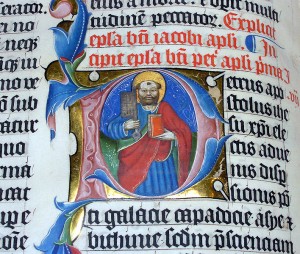Reflections on Latin and the Catholic Church’s Memory and Identity, Part Three
 Part Three, Re-orientating Ourselves to Tradition — an Example:
Part Three, Re-orientating Ourselves to Tradition — an Example:
In the second article in this series, I discussed how the Church’s memory and identity were under siege after the Second Vatican Council vis-à-vis a “para-Council.” In this article, I use private revelation as an example to expand upon how Catholics were misled after the Second Vatican Council.
Under the pontificates of Pope St. Pius X and Benedict XV, the Church compiled her laws into a single volume. This single volume was published in 1917 and became known as the “Code of Canon Law.” In this Code, there were two canons that deeply affected the publication of books alleging private revelation: canons 1399 and 2318. Canon 1399 §5 specifically forbade the publication of such books without having undergone prior censorship by one’s local Ordinary. Canon 2318 concerned the appropriate censures if the law was broken, which included excommunication.
These two canons were rooted in the Index and its system of censorship. As was stated in the second article, Pope Paul VI reformed the Church’s censorship and removing the legal force of the Index was a part of his reform. This effectively meant that it would no longer be updated and become a reminder of the moral law not to endanger one’s faith and morals by reading material contrary to these. It is to be noted that without that legal force, canons 1399 and 2318 were abrogated.
Once the above canons were abrogated, some Catholics thought it permissible that books alleging private revelation could now be published without censorship. This thought, however, is not what Paul VI did or intended and must be understood against the backdrop of the theologians and laymen who formed the “para-Council” spoken of earlier.
The “spirit of Vatican II” created a euphoria among some of the faithful. This euphoria made them inattentive to the divine laws and Papal decrees, which in turn led to amnesia. This amnesia concerns the tragic disconnect looked at in these articles with respect to the ancient learning intimately connected with the patrimony of the Latin Church and language. There is a particular instance of this from the Church’s theology of private revelation that perhaps has been lost among the faithful: namely a distinction of the kind of faith attributed to private revelation.
In the Congregation for the Doctrine of the Faith’s Commentary on the Third Secret of Fatima, Cardinal Lambertini’s De Servorum is cited.[i] This citation concerns a distinction between “Divine” or “Catholic” Faith and that of human faith. The Congregation cites this passage to remind the faithful that all private revelation is not obligatory and that if we believe in an approved private revelation, we assent to it with human faith not Catholic faith as the latter is given only to Divine Revelation.[ii]
After Lambertini’s treatise was written, the theological distinction between “Divine/Catholic” and “human” faith was affirmed 170 years later by Pope St. Pius X in his Encyclical Pascendi Dominici Gregis (Pascendi). In Pascendi 54, Pius X gives legislation on the printing of what he calls “pious traditions” (“piis traditionibus”) under which alleged private revelation is included.[iii] Pius X says such can be believed (after proper investigation) but on the level of human credence for which there is no want for human argument.[iv] It is clear that Pius was borrowing from De Servorum.[v] In order to see this connection however, one would have to be familiar with the patrimony and language of the Latin Church and it is this very thing that is under question.
Regretfully, the euphoria that leads to amnesia and the explosion of books alleging private revelation have combined to force a terrible plague upon the Church. The faithful no longer understand the distinction between “divine” and “human” faith. Moreover, they don’t understand their moral obligations with respect to disseminating materials alleging private revelation. Instead, they cause traffic jams on the streets in order to hear the latest “revelation” from the latest “visionary” and oftentimes choose these over and above the Magisterium.[vi]
Many do not realize that it is possibly an act of apostasy to choose private revelation above the Magisterium. Such an act imperils one’s eternal salvation. Of course, we must leave room for moral arguments of knowledge, culpability, etc., which I leave for individual people to make following a good examination of conscience and for God to adjudicate. The task at hand is to inform Catholics of their moral obligation(s) with respect to the dissemination and treatment of alleged private revelation and provide them with the means to become reintegrated with the heritage of the Faith that is Tradition.
ENDNOTES:
[i] Tarcisio Cardinal Bertone, The Last Secret of Fatima (New York: Doubleday, 2008), 142.
[ii] This distinction is important because there are a number of Catholics who have become fanatically devoted to alleged private revelations as part and parcel of the confusion after Vatican II. There are many reasons why this has happened but the one I have found to be most consistent is the deterioration of proper catechetical formation in the United States and elsewhere since the close of the Second Vatican Council. The media onslaught mentioned earlier in this essay was certainly a contributing factor.
[iii] Acta Sanctae Sedis, Volume XL. (Roma, Vatican, 1907), 648-650. Hereafter ASS followed by volume and page number.
[iv] ASS, (XL), 649. The Latin reads: “…quod etsi rite fiat, non tamen facti veritatem adserit, sed, inisi humana ad credendum argumenta desint, credi modo non prohibit….
[v] It was this legislation given by Pius that partly led to the formation of canon 1399 §5 of the 1917 Code of Canon Law.
[vi] <http://crownofstars.blogspot.com/2011/02/church-overflow-for-vickas-visit.html> (Accessed March 4, 2011).
(© 2011 Kevin Symonds)

